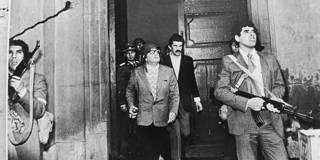For 16 years after Augusto Pinochet's coup on September 11, 1973, Chile was subjected to a military dictatorship, widespread human-rights abuses, and an extraordinarily successful free-market experiment. Today, Chileans are still grappling with a legacy that is as abhorrent as it is enviable.
SANTIAGO – On September 11, 1973, Chile’s armed forces staged a coup to depose Salvador Allende, a socialist physician who had been elected president in September 1970. The presidential palace, La Moneda, was bombed by British-made Hawker Hunter fighter jets and assaulted by tanks and infantry troops. Inside, some 60 people, led by Allende, resisted the onslaught for several hours.
The mutiny, led by army General Augusto Pinochet, marked the beginning of a 16-year military dictatorship. The regime engaged in systematic human-rights violations, and subjected Chileans to a radical experiment in market economics, carried out by a group of followers of Milton Friedman known as the “Chicago Boys.” The dictatorship finally ended in March 1990 with the inauguration of a democratically elected president, Patricio Aylwin.
Half a century later, Chileans are still trying to understand the tragic events that shattered so many lives. Many hoped that the 50th anniversary of the coup would be a time for reconciliation – that old enemies and adversaries would finally come together to condemn the suspension of democratic rule and the widespread abuses that followed. Surely politicians from both sides would vehemently proclaim that the nation must “never again” (nunca más) allow itself to be so traumatized.

SANTIAGO – On September 11, 1973, Chile’s armed forces staged a coup to depose Salvador Allende, a socialist physician who had been elected president in September 1970. The presidential palace, La Moneda, was bombed by British-made Hawker Hunter fighter jets and assaulted by tanks and infantry troops. Inside, some 60 people, led by Allende, resisted the onslaught for several hours.
The mutiny, led by army General Augusto Pinochet, marked the beginning of a 16-year military dictatorship. The regime engaged in systematic human-rights violations, and subjected Chileans to a radical experiment in market economics, carried out by a group of followers of Milton Friedman known as the “Chicago Boys.” The dictatorship finally ended in March 1990 with the inauguration of a democratically elected president, Patricio Aylwin.
Half a century later, Chileans are still trying to understand the tragic events that shattered so many lives. Many hoped that the 50th anniversary of the coup would be a time for reconciliation – that old enemies and adversaries would finally come together to condemn the suspension of democratic rule and the widespread abuses that followed. Surely politicians from both sides would vehemently proclaim that the nation must “never again” (nunca más) allow itself to be so traumatized.